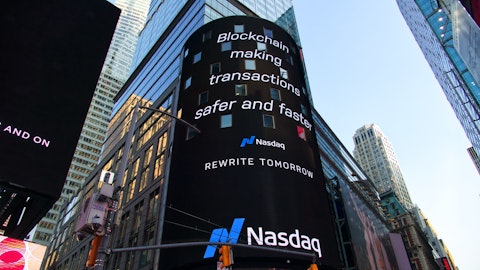David Chiaverini: That’s helpful. And should we expect any increased volatility around that target of 1.5%, given you’re exiting a couple of stable businesses of multifamily and premium finance, but retaining the presumably more volatile Civic business. Can you discuss that?
Paul Taylor: Yes. I mean there’s going to be €“ we’re going to take further actions as we go throughout the year and we’re trying to have any more actions earlier in the year, so we can get a better run rate. So there will be some volatility, I would think that would be in the beginning of this year, and then it should smooth out as we get into the second half of this year and then into 2024.
William Black: So David, in terms of volatility, a big part of this is to build a more consistent, stable earnings profile. And so the volatility has really been on the velocity of assets and that’s a big part of the overall equation where you’re looking at the risk reward of what you’re doing in terms of yield. And then also, as Paul said, addressing the expense side as well.
Paul Taylor: Yes. And that’s just an overarching comment. I mean one of our goals, too, is to take the volatility out of PacWest earnings. I think PacWest earnings typically and historically have been a little volatile and they’re hard to predict, and we’re trying to get a better, smoother, more predictable earnings for The Street.
David Chiaverini: Thanks for that. And then you mentioned that everything is kind of on the table in terms of potentially selling the premium finance business. I’ll ask the same question on the multifamily portfolio. Would you consider selling that to accelerate that off the balance sheet?
Paul Taylor: We definitely would. I believe that those are rates such that it would be very difficult to sell at this time without accepting a pretty significant loss.
David Chiaverini: Did you mention €“ and did you mention on the Civic portfolio, $3.3 billion, did you say what the right size, how much of that could come down over time?
Paul Taylor: Well, I think you’re going to see it definitely come down. Again, we just installed Mark in there about €“ he’s been there for about a week. And we’re still trying to figure out the business PacWest had really adopted sort of a decentralized hands off method when they acquired it, and we’re in there trying to figure it out and try to figure out what type €“ what offerings we’re going to keep and which offerings we’re going to eliminate.
Kevin Thompson: And of course, we had bought flow from the former entity in the past and like the asset, but weren’t as familiar with the business. And so we like the asset. It’s just trying to find the right size within our risk profile and our capital base going forward.
Paul Taylor: But again, overall, I mean, it’s around 10% of our earning assets, and we are going to shrink it below that. I think 10% is too big of a chunk, and we are also €“ the markets are opening up a little better in that area, and we are also looking at trying to sell some of that portfolio just to bring it down.
David Chiaverini: And the last one for me is on venture banking. I noticed on Slide 11, you mentioned the FTX situation. I was curious, in what way does FTX impact your business? Are you guys banking crypto customers?
Mark Yung: No, this is Mark. Yes, the way it impacts is very simple, just increased scrutiny and responsibility and accountability by the VCs to their investors. So greater diligence, a slower cadence of deals.
David Chiaverini: Got it. Thanks very much.
William Black: David, to be clear, we do not have any direct crypto asset exposure.
Mark Yung: That’s correct.
David Chiaverini: Yes. Didn’t think so. Just wanted to clarify. Thank you.
Operator: We’ll take our next question from Andrew Terrell from Stephens.





